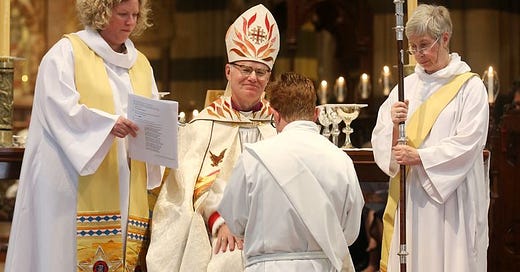A few weeks ago I had the pleasure of attending the ordination of several new Deacons. It is always a proud professor moment to see so many of my students ordained into holy orders and enter the ministry of the diaconate, usually as part of their journey into the priesthood.
A Deacon (Gk. Diakonos) is “one who stands in the middle,” and it usually pertains to service for the believing community. The Christian diaconate began in Acts 6 when the apostles needed to appoint people to the important tasks of caring for the material needs of the vulnerable in the church. The qualification for Deacons are set out in 1 Timothy 3:
8 Deacons likewise must be serious, not double-tongued, not indulging in much wine, not greedy for money; 9 they must hold fast to the mystery of the faith with a clear conscience. 10 And let them first be tested; then, if they prove themselves blameless, let them serve as deacons. 11 Women likewise must be serious, not slanderers, but temperate, faithful in all things. 12 Let deacons be married only once, and let them manage their children and their households well; 13 for those who serve well as deacons gain a good standing for themselves and great boldness in the faith that is in Christ Jesus.
In the Anglican Ordinal of Australia, the exhortation to Deacons at their ordination is as follows:
Our Lord and Saviour Jesus Christ lived and died as the servant of God. All who follow him are called to serve God in the world, setting forward Christ’s kingdom through the power of the Spirit. Christ has called you to the office of deacon. You are to be an ambassador of Christ, serving God as you serve others in Jesus’ name. Proclaim the good news of God’s love, so that many may be moved to faith and repentance, and hearts be opened to do justice, love mercy, and walk humbly in the presence of God. Let the transforming love of Jesus be known to all among whom you live and work. Strengthen the faithful, teach the young, search out the careless and indifferent. Encourage the members of Christ’s body by word and example, ministering among the sick, the needy and all who are oppressed or in trouble. Together with your bishop, priest and people, you are to take your place in public worship, assist in the administration of the sacraments, and play your part in the life and councils of the Church. You are to preach the word of God in the place to which you are licensed, and to pray and work for peace and justice in the world. As a deacon, you are to model your life according to the word of God. Study the Scriptures, reflecting with God’s people upon their meaning, that all may be equipped to live out God’s truth in the world. Put away all that does not make for holiness of life. Be faithful in prayer, that you may have strength to run the race that is set before you. And now, in order that this congregation may understand your intention, and so that your public profession may strengthen your resolve, answer clearly these questions, which I ask you in the name of God and of the Church.
The ministry of the diaconate is important for the church in its holistic ministry. It is a noble ministry in and of itself. And while many proceed beyond the diaconate into the priesthood, it is vital to remember one never gives up those vows. Rather, one takes them with them into whatever future ministries one travels.





As an ordained (retired) deacon in the Methodist Church, I appreciate these word’s affirming the call and service of the deacon as “one who stands in the middle.” I often say the deacon stands in the back of the church to welcome the world into the presence of God and to send believers into world for witness.
Just returning to this from your "Female Deacons" post of Aug 2024, I'm also intrigued by the phrase "one who stands in the middle," because that summarizes what I have been reflecting on about my own calling and vocation this week. What is the origin of that phrase as it pertains to deacons?